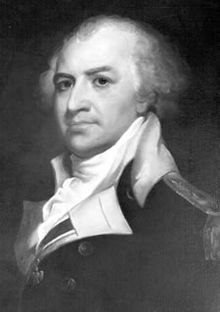Thomas Mifflin
Thomas Mifflin (born January 10, 1744 in Philadelphia , Province of Pennsylvania , † January 20, 1800 in Lancaster , Pennsylvania) was an American politician and major and major general in the Revolutionary War . He was the first governor of Pennsylvania from 1782 to 1799 .
Early years
The son of a wealthy local politician and businessman, studied at a Quaker school before going to the University of Pennsylvania in Philadelphia. There he took his exams at the age of 16. He worked in an accounting department for the next four years before visiting Europe in 1764 . The following year he worked as a businessman with his brother , but politics would determine his future.
Political rise
Thomas Mifflin was a supporter of the American independence movement from the start. As early as 1772 he was a member of the colonial parliament of Pennsylvania. He retained this mandate until the outbreak of the War of Independence in 1775. Between 1774 and 1775 Mifflin was also a member of the Continental Congress , where American independence was discussed and prepared. When the war broke out, he left Congress to join the American Army. There he was initially active on the staff of George Washington . After that he was quartermaster. He was involved in several battles. In the army he made it to the position of brigadier general. Moreover, in the meantime he has apparently joined a conspiracy which, at a critical phase of the war, promoted the removal of George Washington as commander in chief. He then had to end his military career.
Then he devoted himself even more to politics. Between 1778 and 1779 he was again in the House of Representatives from Pennsylvania and from 1782 to 1784 he was again a member of the Continental Congress, where he was even its president in 1783. In 1787 Mifflin was a member of the assembly that drafted the US Constitution. From 1789 to 1790 he was chairman of the Constituent Assembly of Pennsylvania. From 1788 to 1790 he was also chairman of the executive council , which roughly corresponded to the later office of governor. This governing council ruled Pennsylvania from American independence until the constitution came into effect in 1790.
Governor of Pennsylvania
According to the provisions of the National Assembly passed in 1790, Mifflin was elected as a candidate of the Federalist Party for the first governor under the new constitution. After being re-elected twice, he remained in office until December 17, 1799. During his tenure, the so-called Whiskey Rebellion broke out in the western part of the state in 1794 . The background to this was a tax on alcoholic beverages, such as whiskey, introduced in 1791, which sparked outrage and discontent in Pennsylvania. The governor refused to obey President Washington's orders to quell the rebellion. It was about the question of the distribution of power between the individual states and the federal government. To this end, a law was created in Pennsylvania authorizing the governor to use the militia. It was by virtue of that law, rather than Washington's orders, that Mifflin was able to put down the rebellion. The first political parties arose in Pennsylvania during Mifflin's tenure.
As governor, he had to build a new administration. He also tried to reduce the mountain of debt from the time of the American Revolution. At the same time, new laws were drawn up and put into effect. The banking and transport sectors were also placed under state supervision. In his last term in office since 1797, Mifflin got health and financial problems.
Old age and death
After the end of his term of office, Mifflin was a member of the state parliament for a short time before he died in January 1800, impoverished and without an heir. He was married to Sarah Morris and was buried in Lancaster.
Mifflin County is named after him.
literature
- Robert Sobel and John Raimo (Eds.): Biographical Directory of the Governors of the United States, 1789–1978. Volume 4, Meckler Books, Westport, 1978. 4 volumes.
Web links
- Thomas Mifflin in the Biographical Directory of the United States Congress (English)
- Thomas Mifflin in the database of Find a Grave (English)
- Thomas Mifflin, short biography ( memento from February 9, 2006 in the Internet Archive ) (English)
- Thomas Mifflin in the database of the National Governors Association (English)
- Thomas Mifflin ( Memento from June 26, 2008 in the Internet Archive ) in the database of the Pennsylvania Historical and Museum Commission (English)
| personal data | |
|---|---|
| SURNAME | Mifflin, Thomas |
| BRIEF DESCRIPTION | American politician and major general in the Revolutionary War |
| DATE OF BIRTH | January 10, 1744 |
| PLACE OF BIRTH | Philadelphia , Pennsylvania |
| DATE OF DEATH | January 20, 1800 |
| Place of death | Lancaster , Pennsylvania |



